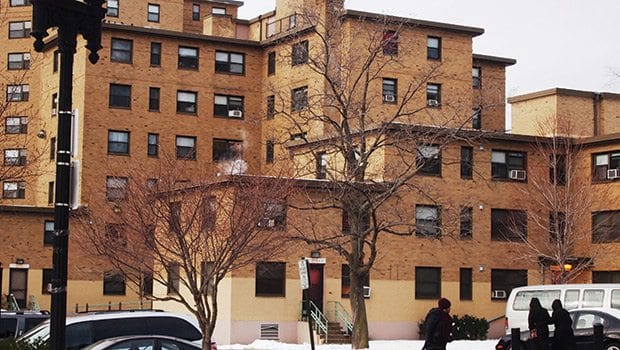BHA seeks nonprofit partners
HUD budget cuts jeopardize repair funding


The Orchard Gardens public housing development. The Boston Housing Authority is seeking ideas on how to partner with developers and nonprofits to preserve affordability in its developments.
After two decades of declining federal funding for the 63 developments in its portfolio, the Boston Housing Authority is looking for new funding sources to help maintain and, if possible, expand the number of affordable housing units available to low- and moderate-income Boston residents.
Last year the agency issued a request for qualifications, seeking ideas from forprofit and nonprofit development entities on how “to optimize the value of BHA sites in high-market neighborhoods, as a means to preserve or expand existing affordable units.”
The agency’s RFQ process for Boston public housing developments comes at the suggestion of the Federal Department of Housing and Urban Development, which provides the majority of the funding for the BHA and other housing authorities across the commonwealth and across the nation.
“HUD is moving housing authorities in the direction of public-private partnerships,” said BHA Director Bill McGonagle. “I’m convinced that the funding for public housing as we know it is gone, and it’s not coming back.”
McGonagle noted that the BHA is not planning to sell any of its property, reduce the number of public housing units in its portfolio, or relocate any of the units to other areas of the city.
“My intention is to find a way to preserve over the long term the public housing units in the city,” he said.
The BHA is working under the auspices of HUD’s Rental Assistance Demonstration program, the agency’s national program to encourage public-private partnerships. Currently HUD provides subsidies for 1.2 million public housing development units nation-wide. HUD officials estimate housing developments across the country have a backlog of $25.6 billion in needed repairs.
While HUD historically has funded both the rental subsidies and repair costs for public housing developments, in recent years congressional budget cutting has forced the agency to pull back.
McGonagle says the BHA is not currently in danger of losing any of the units in its developments due to repair needs, but the agency has been underfunded to the tune of $79 million over the last 20 years, according to its most recent annual report.
Although the BHA has received funds for renovations at several of its major developments – including Mission Main, Orchard Gardens and West Broadway – through its HOPE VI program, and is applying for funds to redevelop the Whittier Street development through the new HUD Choice Communities program, McGonagle says he doesn’t foresee the agency having the means to adequately maintain all 12,623 units in its developments in the coming years.
“Congress is not going to bring HUD funding back to the previous levels,” he said.
In addition to funding for repairs, HUD has cut funding for security, community services and other areas, notes US Rep. Michael Capuano, whose 8th Congressional District includes several major public housing developments in Boston, Cambridge, Chelsea, Everett and Somerville.
“It’s not going to get any better in the short term,” he said of the HUD budget. “The country has shifted to the right. HUD, like everyone else, is trying to figure out the direction the country is going in.”
But Capuano notes that public-private partnerships are not new to HUD.
“Most public housing was built by private developers with public funds,” he said.
McGonagle stressed that the agency does not have set notions about what the public-private partnerships might look like. Nonprofits, like community development corporations, have access to a wider range of funding options for renovating buildings, like federally-funded low-income tax credits.
For-profit developers could potentially build market rate units or commercial space on parcels currently occupied by BHA developments, using revenue from the new development to subsidize or expand existing units.
McGonagle had not read any of the RFQs submitted by last week’s deadline, when reached by phone, but said the agency received “a bunch.”
One community development corporation that did submit an RFQ, Dudley Square-based Nuestra Comunidad, submitted ideas for four Lower Roxbury developments, according to Executive Director David Price.
Price would not disclose the ideas or developments, but said he thinks rising real estate values and rents in Boston could work to the BHA’s advantage.
“The closer you are to the South End, the greater the possibility of creating market rate units that subsidize affordability,” he said.
McGonagle said the BHA is in the preliminary stages of considering ideas.
“If we do want to move forward with a request for proposals, it will be very limited,” he said. “It will not be wholesale. We will not move forward without extensive input from public housing residents and the greater community as well. It would be an exhaustive and inclusive process. Our primary goal is preserving public housing. And I think it’s possible that we could create more affordable housing units.”







